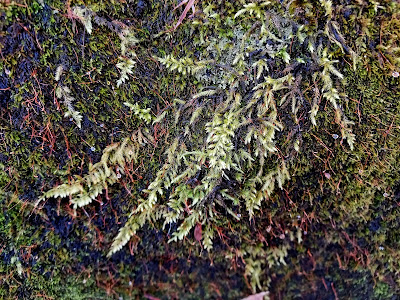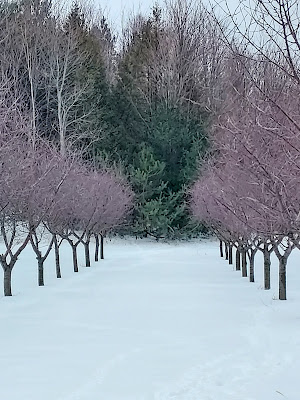We finally had a big snow. Plows were at work for days and days. Is what we are experiencing now simply a late January thaw, to be followed by another couple months of winter? Mother Nature doesn’t seem any surer than we are – and feels as ready as we are to welcome spring. But no ice fishing? No ice boating? Can we call it winter at all? Some are wondering, saying, "It doesn't feel right."
I didn't make a New Year’s resolution, but I did decide that instead of publishing bare lists of books read, either by the year or the quarter-year, in 2024 I will give the lists monthly and annotate lightly. Don’t look for full reviews here (when I have written more elsewhere, I will include a link), just somewhat a little more indication than ‘fiction’ or ‘nonfiction’ of what you can expect to find inside the covers if you look for any of these books.
So here they are, the books I read this January 2024:
1. Straight, Susan. The Country of Women (nonfiction). I characterized this elsewhere as “a long love letter addressed to her three daughters, telling them everything she knows about previous generations on both sides of the family.” I love this author!
2. Brach, Tara. Radical Compassion (nonfiction). A how-to text for getting below and beyond anger, knowing ourselves better, and loving others better.
3. Mosley, Walter. Always Outnumbered, Always Outgunned (fiction). Of all Mosley’s novels, this is my favorite, a book I consider absolutely perfect. The HBO film version is excellent, too, no doubt thanks to the author’s involvement in the production.
4. Picoult, Jodi. My Sister’s Keeper (fiction). The only novel of Picoult’s I have read, I found it well written and compelling but was disappointed in the ending, which seemed unnecessarily contrived and over the top.
5. Johnson, James Weldon. The Autobiography of an Ex-colored Man (fiction). Johnson was not only a writer but a real VIP: Broadway lyricist, the first Black lawyer admitted to the bar since Reconstruction, consul to Venezuela and Nicaragua, university professor, civil rights activist, and head of the NAACP for ten years. This work should be more widely read than it is today.
6. McCullers, Carson. The Heart is a Lonely Hunter (fiction). It was only coincidence that I read this novel, featuring the deaf Mr. Singer, right after reading Johnson’s novel with another fictional Mr. Singer. Both are classic American stories, and both highlight the loneliness often found at the heart of the American Dream.
7. McHugh, Laura. Arrowood (fiction). This semi-Gothic, cold case story was more engaging than I expected, and I am interested now in reading the author’s The Weight of Blood, set deep in the Ozarks, as the first few pages included following the end of Arrowood gave a vivid sense of place that I did not find in the novel I read.
8. Clymer, Eleanor. The Trolley Car Family (fiction – juv.). A charmingly written and illustrated children’s story set in the early post-WWII period, with streetcars, milkmen, and small family subsistence farms. Never didactic, often rough-and-tumble, a summer in the country provides adventures and lessons for the Parker children.
9. Deaton, Angus. Economics in America: An Immigrant Economist Explores the Land of Inequality (nonfiction). Deaton explains what it is that economists do, inside and outside the academy, and explores ways that American systems (such as healthcare) and American expectations and beliefs differ from those in Europe and the U.K.
10. Van Dyke, Henry. Little Rivers (nonfiction). Author, diplomat, educator, and clergyman, Van Dyke appears in these reminiscences as a travel and fly-fishing aficionado. Although he generally has guides and camp cooks and paddlers to do the work out in the wilderness, he keeps them behind the scenes, and he does plenty of tramping himself from place to place.
11. Anselmo, Anthony. The Spirit of the North Wind (fiction – YA). This novel from a member of the Sault Ste. Marie Ojibwe tribe combines, in a thirteen-year-old’s vision quest, both happy modern family life and elements of magic realism.
12. Foster, Elizabeth. Gigi in America (fiction – juv.). No, not the “funny little girl” from Paris. This Gigi, male, began life in Vienna, and he is a merry-go-round horse. Until they grow too big for the horses’ saddles, children who ride the merry-go-round horses can enter into conversation with them, and several children help Gigi return to the first little girl he loved, now grown up with a daughter of her own. World War II intrudes but only in rather vague, subtle ways. Gypsies are for the most part portrayed in a positive light.
13. Hopson, Nasugraq Rainey. Eagle Drums (fiction – YA). Expecting another vision quest, I was taken much further by this retelling of the Inupiaq society creation myth, small family groups learning from golden eagles how to live together in harmony and pass on their history in song and dance. Mesmerizing and important work.
14. Cott, Jonathan. Wandering Ghost: The Odyssey of Lafcadio Hearn (nonfiction). Excerpts from Hearn’s own writings are so numerous and so lengthy that he deserves to be called a co-author on this volume, but in the end I have no complaint with either man’s contributions. Cott is sympathetic to his subject, and Hearn so completely himself, that the result is superb.
15. Hesse, Hermann. Autobiographical Writings (nonfiction). The selection takes him through life into old age, and he doesn’t hide his feelings. His likes and loves, agonies and peeves are all expressed. He would not have wanted to meet you or me, but here he is, revealed to us all.
16. Meis, Morgan. Ruins: Selected Essays (nonfiction) Surprising. Meis, Ph.D. in philosophy, is a man of catholic interests and thoughtful opinions on such diverse subjects as art, literature, “ruin porn,” the freedom of private life in formerly Communist East Berlin, and the public commemorations of tragedies. I was particularly fascinated by the essay on David Foster Wallace’s The Pale King. Though I doubt I will ever read that novel, unfinished at the time of the author’s death (I have read Infinite Jest and many of DWF’s essays), I look forward to reading more essays by Morgan Reis.
17. Campbell, Bonnie Jo. The Waters (fiction). Since this was my second reading and the first was not long ago, I was able to appreciate anew and in much greater depth countless details on almost every page of this novel, some having to do with the setting, others foreshadowing events or, often, borrowing from or echoing familiar myths and fairy tales. The Waters is not a simple “retelling” of any one particular older story but contains timeless worlds within itself, even with a setting that could not be more local to southcentral Michigan. And her characters are true to the bone. So proud that she’s a Michigan writer!
18. Straight, Susan. Aquaboogie (fiction). I’ve already written that Susan Straight and Bonnie Jo Campbell have a lot in common. Both write of real people in real places, such that you are pulled irresistibly into a world you may never have encountered before. This volume of Straight’s, her first published book, is short stories and is the fourth book of hers I’ve read, following two novels and a memoir. Highly recommended author!
19. Berger, John. Ways of Seeing (nonfiction). From oil paintings to photography to advertising images, Berger pursues a thesis of the power of wealth and its message to the rest of us. “Glamour cannot exist without personal social envy…. The industrial society which has moved towards democracy and then stopped half way is the ideal society for generating such an emotion.”
Again and again, I echo the words of Christopher Morley’s fictional Roger Mifflin: “Thank God I am a bookseller!” I don’t promise my customers that they will become happy and glamorous, desirable and envied when they buy books from me. Instead I offer them food for thought and hassle-free armchair travel to worlds real and imaginary.
One last thought for today:
Have others besides me noticed how often businesses “need” our feedback these days? There are no more simple transactions, it seems, in which what we paid for is delivered to us and that's all there is to it, but an ongoing, endless plucking at our sleeves, a kind of needy attempt to establish a “relationship.” I might be inclined to thank salespeople in person (or on the phone) or send a grateful note, but I find these endless requests for e-mail feedback unnecessary and annoying, not only because there are so many of them but also because they ask formulaic questions and provide answers from which I must choose.
I don’t and won't do that to my customers! When I mess up (which I try not to do very often), I apologize! On the other hand, frequent repeat customers make me very happy, and many have become my friends over the more than 30 years I’ve been in business, and that did not happen because I asked them to "rate their experience” on a scale of 1 to 5 or 6 or 10.
Do we understand each other? You don’t have to answer that, because yes, I think we understand each other!








































